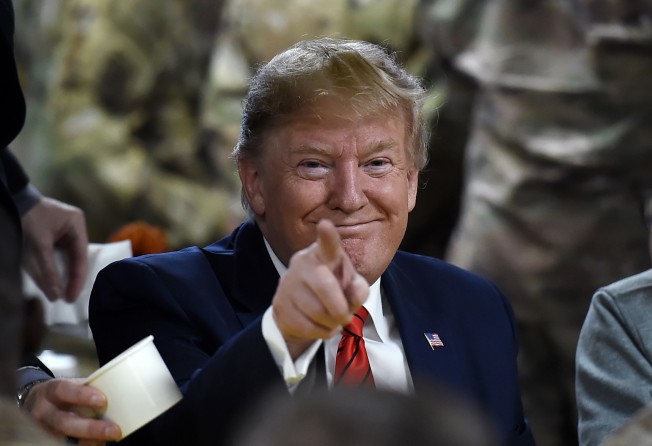Phase one trade deal could spur growth, benefit Asian financial markets in 2020, Credit Suisse says
- US-China trade deal would resolve ‘negative implications’ that have weighed on manufacturing, according to Credit Suisse’s John Woods
- Woods sees 2020 as a year of ‘resilience’ and constructive backdrop for Asian markets

A “phase one” trade deal between the US and China could spark a growth recovery in Asia in early 2020, easing a drag that has weighed on industrial production for much of this year, according to John Woods, Credit Suisse’s chief investment officer for Asia-Pacific.
Woods said the bank expects “moderate” global economic growth next year at a 2.5 per cent pace and financial markets are likely to benefit as industrial production recovers.
“I think a number of the drags on economic growth that we witnessed very very much in 2019 are diminishing,” he said. “A resolution of sorts to the trade dispute, which is pretty much anticipated and almost baked into the price, is likely to resolve some of the very negative implications for the manufacturing sector, which clearly impacted growth this year.”
Woods expects 2020 to be a year of “resilience” and foresees a constructive backdrop for Asian equities because of reduced trade tensions, more dovish central bank policies and indications of a “trough” in Asia’s economic downturn.
The firm, however, remains “cautiously constructive” given potential challenges next year, such as a polarising presidential election in the United States, increasing margin pressure and rising corporate debt.
The trade war has raged between the world’s two biggest economies for more than a year, with the US placing tariffs on hundreds of billions of dollars of Chinese goods and China retaliating with its own tariffs. The Trump administration is trying to force Beijing to change decades of industrial, trade and technology policy.
US President Donald Trump announced a “substantial phase one deal” in October, but an agreement has yet to be signed as Beijing is insisting the US rescind tariffs and disagreements remain over how much of American agricultural products it will purchase as part of any deal.
Another round of tariffs is set to go into effect on December 15 if no deal is reached, but Woods said he expected those tariffs will be postponed if no pact is announced before then.
Our great Farmers will recieve another major round of “cash,” compliments of China Tariffs, prior to Thanksgiving. The smaller farms and farmers will be big beneficiaries. In the meantime, and as you may have noticed, China is starting to buy big again. Japan deal DONE. Enjoy!
— Donald J. Trump (@realDonaldTrump) November 17, 2019
Sean Taylor, chief investment officer for Asia-Pacific at the asset manager DWS, separately said he is confident a phase one deal will be reached, which could bolster investor sentiment.
“We do think there will be a phase one deal. A lot of people are saying, ‘Sean, it’s already priced in’,” said Taylor. “If we do have a phase one deal [and] if we don’t have tariffs rising December 15, the one factor people haven’t put into their forecast is confidence … Confidence is really low in terms of sentiment and investment today.
“If we have a phase one deal ... I do think there will be a pick up in confidence and that will certainly help earnings numbers. ”
The American political news website Axios, citing a source close to the Trump negotiating team, reported on Monday that the deal was now stalled over passage of the Hong Kong Human Rights and Democracy Act, which would potentially subject Hong Kong to diplomatic and economic sanctions if the city’s autonomy from mainland China was undermined.
Beijing has previously warned the US to avoid interfering in its internal affairs. This week, it suspended visits to Hong Kong by US military vessels and aircraft and sanctioned US-based non-government organisations for “supporting anti-China forces” in Hong Kong.
The legislation was passed following months of anti-government protests and civil unrest in Hong Kong that began with a controversial extradition bill that would have made it easier to extradite criminal suspects to mainland China for trial. The demonstrations have evolved into a broader discussion about income inequality and Beijing’s influence over the city’s affairs.
The unrest, which has disrupted transit and discouraged tourists from visiting Hong Kong, sent the city’s economy into a “technical recession” in the third quarter. Financial Secretary Paul Chan Mo-po said on Monday the economy was expected to contract by 1.3 per cent for the full year as retail sales in Hong Kong experienced their biggest decline on record in October.
The uncertainty created by the demonstrations and escalating violence between police and radical protesters has also weighed on shares traded in Hong Kong, including so-called H shares – mainland companies listed in the city. The Hang Seng Index has been the worst-performing benchmark globally this year.
Taylor said H shares are looking “quite cheap”, particularly when compared with A shares traded in the mainland. “We would see H shares next year outperforming A,” he said.